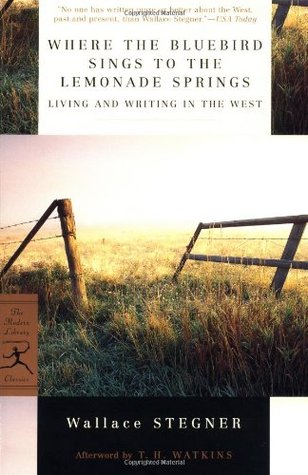At the age of 83, Wallace Stegner is the éminence grise of Western American literature, a man responsible for shaping the writing not only of the region but also that of points eastward, thanks to the scores of graduates from the Stanford writing program that bears his name. Stegner’s work, regrettably, sells far less than that of lesser transplants like, say, Gretel Ehrlich or Bret Easton Ellis. Regrettably, I say, because his books are exemplary, whether novels like Angle of Repose, biographies like The Uneasy Chair and Beyond the Hundredth Meridian, or historical studies like Mormon Country. Regrettably, too, because Stegner—the American writer most deserving of the Nobel Prize in Literature—still has much to tell us.
He reiterates some of the themes of his life’s work in Where the Bluebird Sings to the Lemonade Springs, collecting essays on a range of subjects. Among the most successful are those that open the book, memoirs of Stegner’s long tenure as a Westerner. In them, he writes affectingly of his parents; his father, a speculator who dragged his family from one dusty town to another in search of easy riches and “died broke and friendless in a fleabag hotel, having in his lifetime done more human and environmental damage than he could have repaired in a second lifetime,” his mother prematurely aged by a rootless life marked by one humiliation after another. Stegner has never been quite so open with his past, and his reflections help set the body of his writing in clearer context. The title of his collection similarly derives from a pole in Stegner’s upbringing: Harry McClintock’s hobo ballad of 1928, “The Big Rock Candy Mountain,” which promised that drifters would find in the West a land dripping with cool streams of alcohol and teeming with handouts growing from every bush. Those images have haunted Stegner for seven decades (The Big Rock Candy Mountain is one of his early novels). They evoke all that is right and wrong with the West: a land full of riches, but full of fool’s promises as well.
Years ago, Stegner called the West “hope’s native home.” He is less buoyant today. Indeed, many of the essays in the second section of his book, dealing with the West as a series of environments, are marked by an unwonted despair. Regarding the arid lands of the West as “less a place than a process,” he now sees reason for us to abandon hope at its gates, now that its great cities are “growing to the limits of their water and beyond, like bacterial cultures overflowing the edges of their agar dishes and beginning to sicken on their own wastes”; now that the irreparable damage of its vast irrigational “plumbing” projects is becoming increasingly apparent; now that the “western myths that aggrandized arrogance, machismo, vigilante or sidearm justice, and the oversimplified good-guy/bad-guy moralities invented mainly by East Coast dudes fascinated by the romantic figure of the horseman, and happily appropriated by a lot of horsemen and sidearm Galahads as self-justification,” which Stegner has long hoped to dispel, have come to be taken for history itself.
This is not the diplomatic, eminently reasonable Stegner we have come to know through thirty-odd books. In his last years, Stegner, it seems, is becoming a cultural rebel, disinclined to roll with the punches. He recently declined a National Medal for the Arts, citing his dislike for the politicization of American arts in general and the government’s role in the culture business generally. He is equally quick to condemn the private sector’s current crop of get-rich-quick hucksters who guide the West’s economy and politics—the Sagebrush Rebellion jockeys and welfare ranchers—for their overall role in the nation’s destruction. In the last matter, his essay “A Brief History of Conservation” is a hallmark of political discourse.
The closing section of Where the Bluebird Sings to the Lemonade Springs is given over to Stegner’s disquisitions on writers and writing. He pays homage to two near-contemporaries, George R. Stewart—a forgotten author whose work deserves a new audience—and Walter van Tilburg Clark, the author of the fine novels The Ox-Bow Incident and The City of Trembling Leaves, and to his former student Wendell Berry, the Kentucky farmer, writer, and critic of industrial agriculture. He turns to his own work as well, explaining that he writes “to make sense of my life” (a good enough reason, and a characteristically modest one at that) and offering an observation that beginning writers would do well to memorize:
You take something that is important to you, something you have brooded about. You try to sec it as clearly as you can, and to fix it in a transferable equivalent. . . . Sure, it’s autobiography. Sure, it’s fiction. Either way, if you have done it right, it’s true.
“The land will not be lived in except in its own fashion,” Mary Austin once remarked of the West. The history of the region has been marked for two centuries by a willful disregard for the land’s logic. That has riled Wallace Stegner to new passions, and we should be glad to have his anger and his fine new book.
[Where the Bluebird Sings to the Lemonade Springs: Living and Writing in the West, by Wallace Stegner (New York: Random House) 227 pp., $21.00]



Leave a Reply